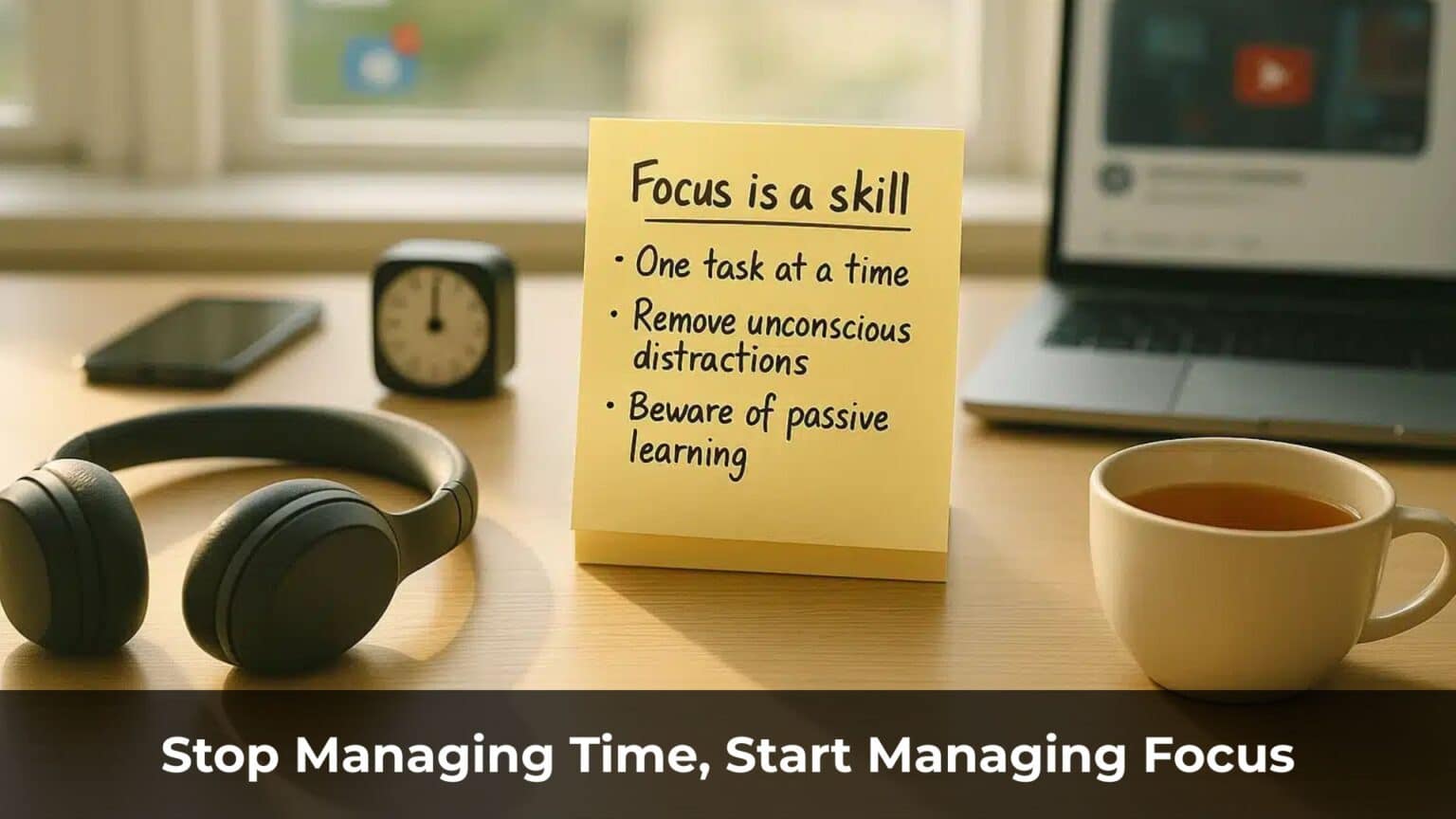Is it true that “smooth talking will get you everything in life”?
I used to believe this blindly, until I learned some expensive lessons. Over the years in my career, I’ve met people whose words were as sweet as honey, but whose actions cut like a knife.
The most skilled talkers are sometimes the ones we should fear most – not because they’re evil, but because we never know which face is their real one.
This article isn’t just for others – it’s for us. To learn how to recognize and protect ourselves from those who use words as weapons of manipulation.
Important: This article doesn’t deny the value of skillful communication in civilized society. Instead, it points out the danger when it becomes a tool for deception and manipulation.
Table of Contents
ToggleSweet Poison – When Words Become Weapons of Manipulation
Here’s a story that happened at a company. During a company party, when the boss praised an employee for being hardworking and talented, this guy said to the boss: “There are no weak soldiers under a capable general.”
It sounded great – he had cleverly complimented his superior.
But was it genuine praise? Not necessarily!
According to research by Dr. Robert Cialdini in “Influence: The Psychology of Persuasion,” people tend to trust those who make them feel good about themselves. This is exactly the principle that manipulators exploit.
Smooth talking becomes dangerous when:
- The timing is too perfect: Smooth talkers always know exactly when to say what
- There’s no opposing viewpoint: They never disagree with you, even on issues that clearly have multiple perspectives
- It feels too easy: You feel suspiciously “satisfied and content”
- There’s inconsistency: Words and actions don’t match
When someone makes you feel like “the most special person in the world” from the very first meeting, be careful. Real emotions need time to develop.
The “3-time verification” method I use:
- Time 1: Listen to what they say
- Time 2: Observe what they do
- Time 3: See how they react when facing difficulties
Only when all three times are consistent do I start to trust.
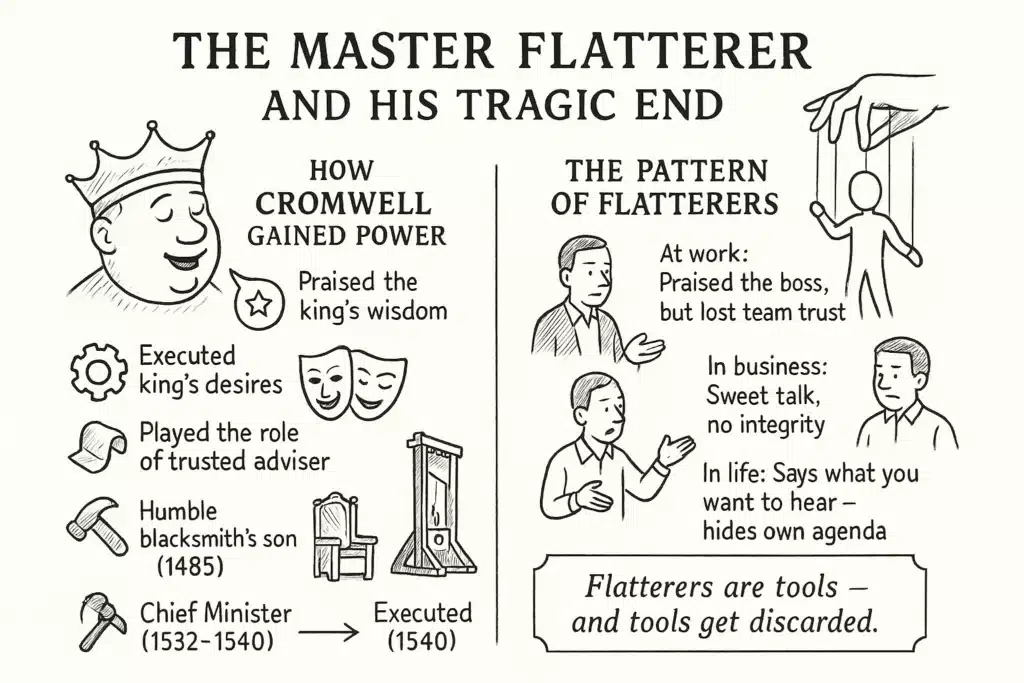
The Master Flatterer and His Tragic End
Let me tell you about one of history’s most notorious examples of smooth talking gone wrong.
In 16th century England, there lived a man named Thomas Cromwell. Born around 1485 into a humble blacksmith’s family in Putney, Cromwell rose to become one of the most powerful men in King Henry VIII’s court through nothing but his silver tongue and political cunning.
Cromwell understood Henry VIII’s psychology perfectly:
- Craved validation: Cromwell constantly praised the king’s wisdom and divine right to rule
- Wanted to hear good news: Cromwell positioned himself as the architect of Henry’s desires, particularly the English Reformation
- Needed someone who “understood” him: Cromwell became Henry’s most trusted adviser by appearing to share the king’s vision
The fascinating part? Henry VIII knew exactly who Cromwell was. Historical records show that Henry was well aware of Cromwell’s ambitions, yet he used him as his chief minister from 1532 to 1540 because Cromwell could accomplish what the king wanted done.
Henry used Cromwell as a “tool,” and when the king no longer needed him, Cromwell was executed on July 28, 1540. The irony? Cromwell had helped Henry break from Rome and establish royal supremacy over the English church, but when Henry wanted to distance himself from the more radical Protestant reforms, Cromwell became the scapegoat.
The lesson: Skilled flatterers might achieve temporary power, but they never earn genuine respect. They’re just tools, and when they’re no longer useful, they get discarded.
You see this pattern everywhere:
- Employees who only know how to flatter the boss often get isolated by colleagues
- In business, partners who only know sweet talk usually aren’t trustworthy long-term
- In personal relationships, people who only tell you what you want to hear usually have their own agenda
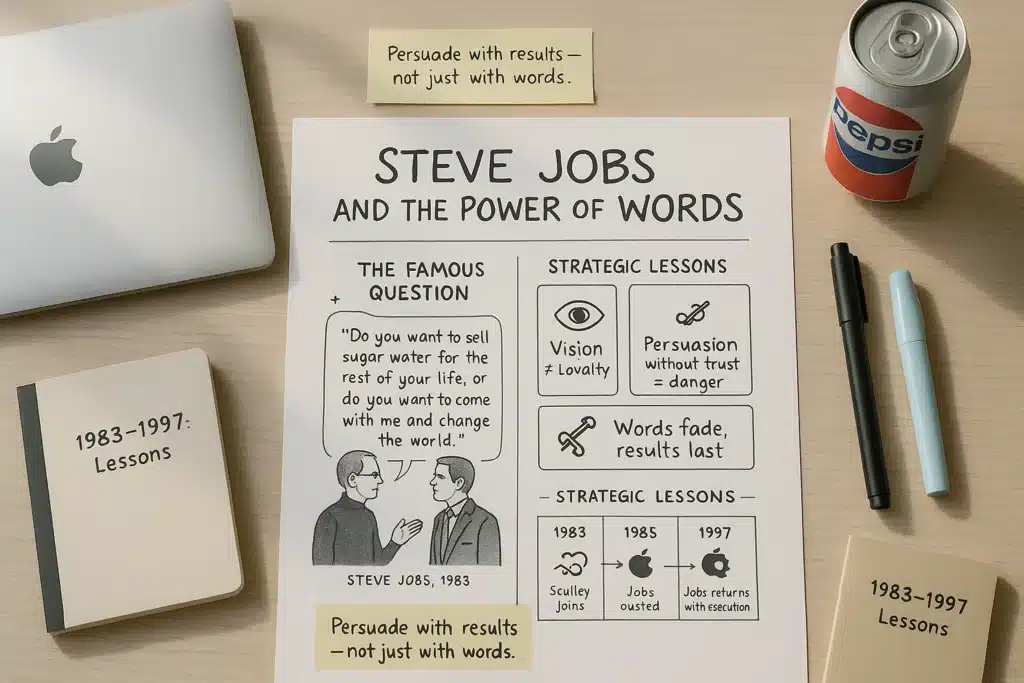
Steve Jobs and the Lesson About the Power of Words
In 1983, Steve Jobs was looking for a CEO for Apple. He targeted John Sculley – the successful CEO of Pepsi, one of the world’s largest beverage brands.
Steve Jobs used a famous line to persuade Sculley: “Do you want to sell sugar water for the rest of your life, or do you want to come with me and change the world?”
This line hit Sculley’s deepest psychology – the desire to do something “greater” than selling soft drinks. Sculley agreed to leave Pepsi for Apple.
But just two years later, Sculley kicked Steve Jobs out of Apple – the very company Jobs had founded.
Sculley realized that Steve Jobs had used psychology to persuade him, and he decided to use the very position Jobs had given him to eliminate Jobs.
Why did this happen?
- Steve Jobs misjudged: He thought persuasion through “vision” would create loyalty
- Sculley felt deceived: When he realized he’d been persuaded through “manipulation,” he lost trust
- Power changes people: Sculley went from being the persuaded to being the one in power
The lesson: Smooth talking might help you win short-term, but if the person being persuaded feels deceived, they’ll become your most dangerous enemy.
Steve Jobs had to spend 12 years before returning to Apple (1997). During that time, he learned a valuable lesson: instead of persuading with words, persuade with results.
When he returned to Apple, Steve Jobs no longer relied on his speaking ability to lead. Instead, he relied on clear vision and excellent execution.
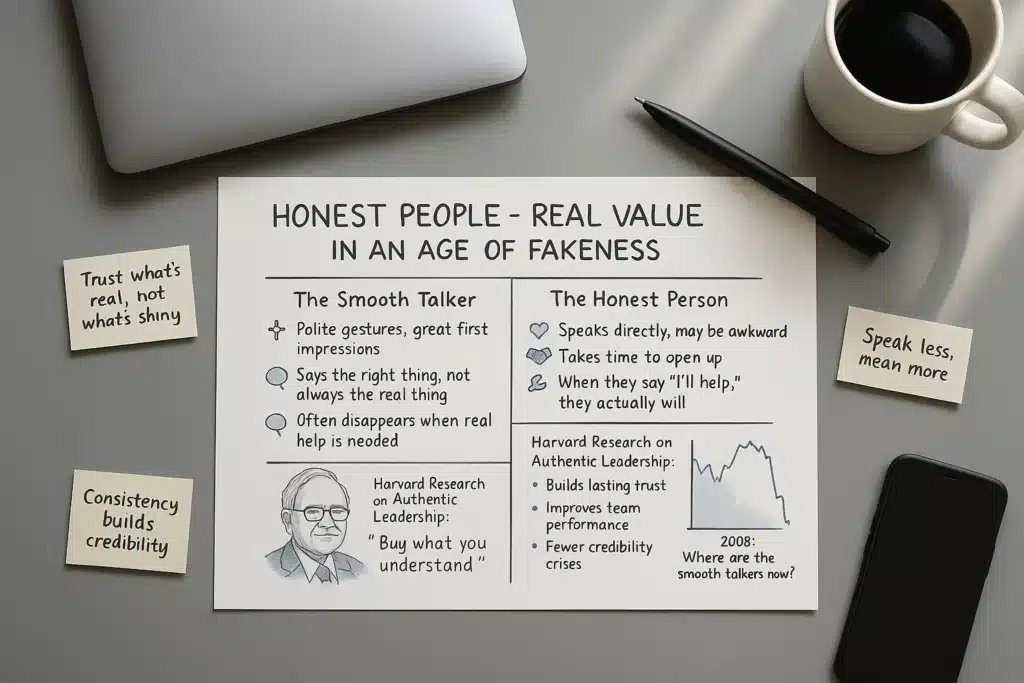
Honest People – Real Value in an Age of Fakeness
Over my years of working, I’ve noticed something interesting: the most sustainably successful people are often not the best speakers.
In communication, you’ll notice two types of people:
The “sophisticated” smooth talker:
- Knows how to pull out chairs and open doors politely
- Speaks in ways that make you feel special
- Always knows what to say at the right moment
- Makes a great first impression
The “awkward” honest person:
- Might not know how to express emotions smoothly
- Speaks directly, sometimes “tactlessly”
- Needs time to open up
- But when they say “I’ll help you,” they actually will
According to Harvard University research on “Authentic Leadership,” authentic leaders tend to:
- Create longer-lasting trust
- Have better team performance
- Face fewer credibility crises
Think about the most successful people you know. Are they the smoothest talkers, or are they the ones who consistently deliver on their promises?
Warren Buffett, one of the world’s most successful investors, is known for his straightforward, sometimes blunt communication style. He doesn’t use fancy words or complex jargon. He speaks plainly about complex financial concepts, and people trust him because his words match his actions.
Compare this to the countless smooth-talking financial advisors who promised incredible returns right before the 2008 financial crisis. Where are they now?
Will You Choose Authenticity or Smooth Talk?
Here’s the uncomfortable truth: in our social media age, we’re rewarded for being performative rather than authentic. The person with the best Instagram captions gets more likes than the person doing actual good work behind the scenes.
But here’s what I’ve learned after years of watching both types succeed and fail:
Smooth talkers win the sprint, but authentic people win the marathon.
Why? Because trust compounds over time. Every time you do what you say you’ll do, you make a deposit in your credibility account. Every time you say one thing and do another, you make a withdrawal.
The smooth talker might get the initial opportunity, but the authentic person gets the repeat business, the referrals, and the long-term relationships that actually build wealth and success.
I’m not saying you should be rude or socially awkward. Good communication skills matter. But there’s a difference between being a good communicator and being a manipulator.
Good communicators:
- Say what they mean and mean what they say
- Admit when they don’t know something
- Give credit where credit is due
- Apologize when they’re wrong
Manipulators:
- Tell you what you want to hear
- Never admit ignorance or mistakes
- Take credit for others’ work
- Blame others when things go wrong
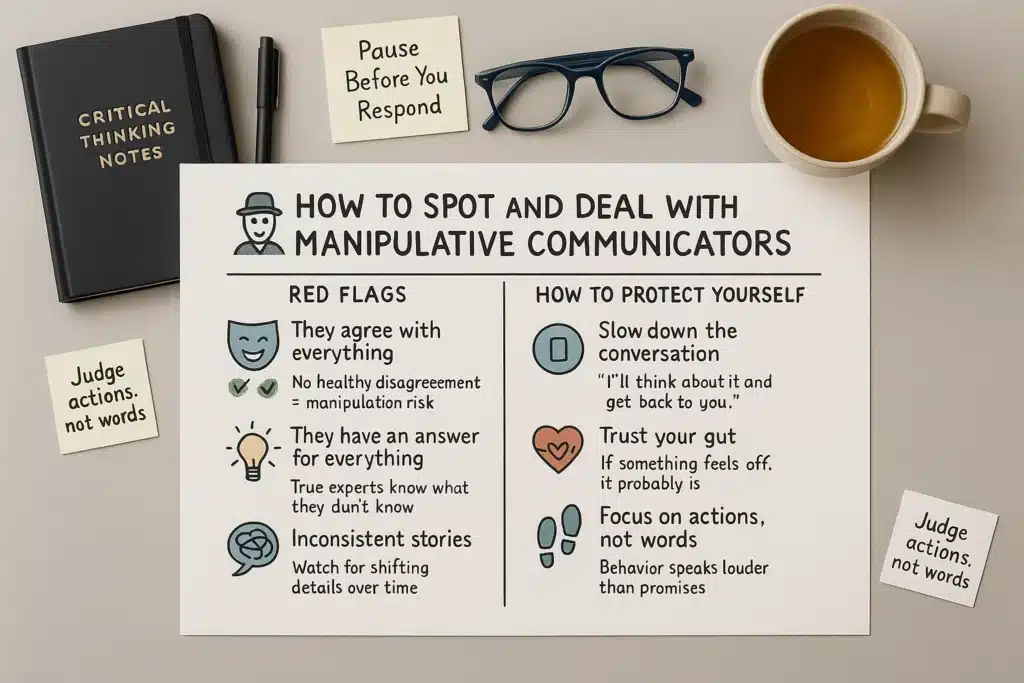
How to Spot and Deal with Manipulative Communicators
After years of dealing with both types, I’ve developed a system for quickly identifying manipulative communicators. Here’s what to watch for:
Red Flag #1: They agree with everything you say
Healthy relationships involve some disagreement. If someone never challenges your ideas or offers alternative perspectives, they’re probably more interested in manipulating you than helping you.
Red Flag #2: They have an answer for everything
Real experts know the limits of their knowledge. If someone claims to be an expert in everything and has a quick answer to every question, be suspicious.
Red Flag #3: They rush you to make decisions
Manipulators create artificial urgency. They’ll say things like “This offer expires tonight” or “You need to decide now.” Honest people give you time to think.
Red Flag #4: Their stories don’t add up
Pay attention to details. Manipulators often embellish or change their stories. Keep mental notes of what they tell you and see if it stays consistent over time.
How to protect yourself:
- Slow down the conversation: When someone pushes hard, just say “I’ll think about it and get back to you.”
- Ask for references: If someone claims expertise or success, ask to speak with previous clients or colleagues.
- Trust your gut: If something feels off, it probably is. Don’t ignore that feeling just because someone is charming.
- Focus on actions, not words: Judge people by what they do, not what they say they’ll do.
Building an Authentic Communication Style
So how do you communicate effectively without being manipulative? Here’s what I’ve learned:
Be direct but kind: You can tell the truth without being brutal. “I don’t think this approach will work because…” is better than either lying or being harsh.
Admit your limitations: When you don’t know something, say so. People respect honesty more than fake expertise.
Keep your promises: Only commit to what you can actually deliver. It’s better to under-promise and over-deliver than the reverse.
Listen more than you talk: The best communicators are often the best listeners. Ask questions and genuinely care about the answers.
Be consistent: Make sure your private behavior matches your public persona. Authenticity means being the same person whether anyone is watching or not.
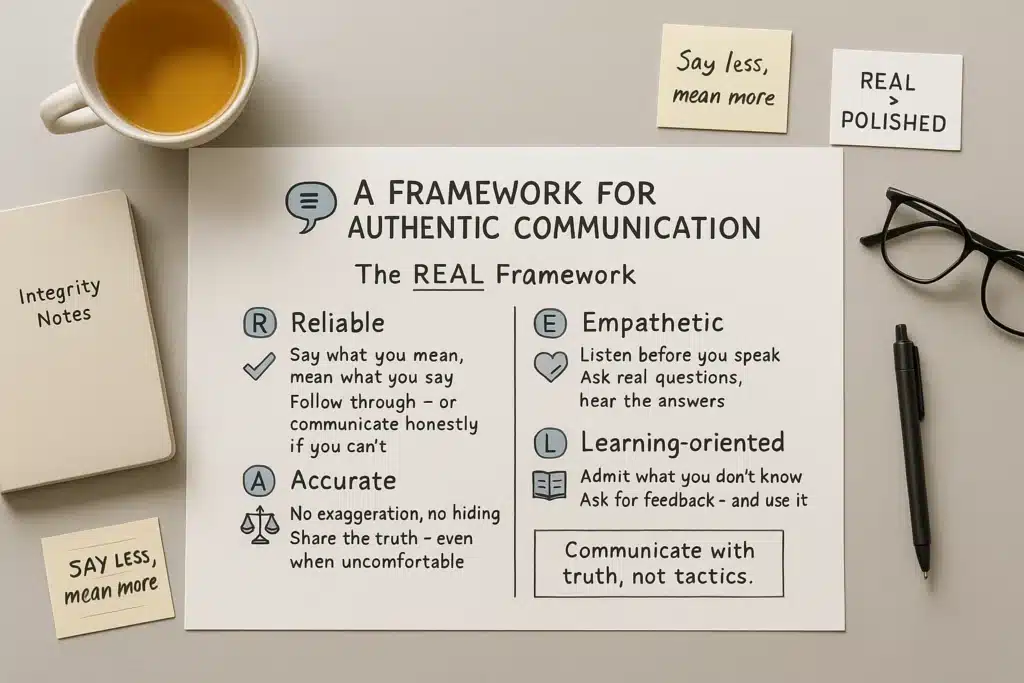
A Framework for Authentic Communication
So how do you communicate authentically without being naive or ineffective? Here’s a framework I’ve developed over years of observing both smooth talkers and authentic communicators:
The REAL Framework:
R – Reliable: Say what you mean and mean what you say. If you commit to something, follow through. If you can’t follow through, communicate early and honestly.
E – Empathetic: Understand the other person’s perspective before trying to make your point. Ask questions and listen to the answers.
A – Accurate: Don’t exaggerate your achievements or downplay your failures. Present information as accurately as possible, even when it’s not in your favor.
L – Learning-oriented: Admit when you don’t know something. Ask for feedback and actually use it to improve.
This framework helps you communicate effectively while maintaining your integrity.
Living Authentically in a Fake World
I’ll be honest with you – choosing authenticity isn’t always easy. In a world that rewards performance over substance, it can feel like you’re playing by different rules.
You’ll watch smooth talkers get promoted while you’re still grinding away at your desk. You’ll see manipulators close deals while you’re still building trust with prospects. You’ll watch fake influencers get millions of followers while authentic creators struggle to be heard.
But here’s what I want you to remember: you’re not just building a career or a business. You’re building a life. And at the end of that life, what matters isn’t how many people you fooled or how many quick wins you achieved.
What matters is the relationships you built, the people you helped, the positive impact you made, and the person you became in the process.
The smooth talkers might win some battles, but the authentic people win the war. They win because they can sleep peacefully at night, knowing they’ve lived with integrity. They win because they’ve built something real and lasting. They win because they’ve become someone worth being.
So the next time you’re tempted to tell someone what they want to hear instead of what they need to hear, remember this: authenticity isn’t just the right thing to do. It’s the smart thing to do.
In a world full of fake, being real is your competitive advantage.
The choice is yours: Will you be a smooth talker who wins today but loses tomorrow, or an authentic person who builds something that lasts?
I know which one I’m choosing. The question is: what about you?










